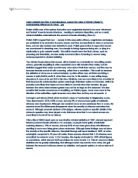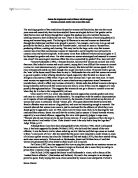Critically Evaluate the Functionalist Perspective on Education
Critically Evaluate the Functionalist Perspective on Education For the Functionalists, education performs a positive function for all individuals in society and has a powerful influence over it. The education system serves the needs of an industrial society by providing a more advanced division of labour; socialising new generations into societies shared norms and values and, according to meritocratic criteria, allocates roles in. Education supposedly meets societies through three related economic roles; socialisation; allocation and vocational training. Firstly, Durkheim and Parsons (1956-9) stated that the education system involves the transmission of socially agreed norms and values, known as the 'Value Consensus', to future generations. This was done through both the 'formal' curriculum and the 'hidden' curriculum, and its economic role is referred to as socialisation or social control. The formal curriculum is more commonly known as the National Curriculum and so is thus the timetabled lessons the state lays out for students to undertake. However, the hidden curriculum teaches such moral lessons as the reward and punishment system, by which students must conform to and obey more authoritative persons (teachers), and installs a sense of work ethic, like punctuality and co-operation. Functionalist theorists believe that this internalisation of norms and values results
Outline and evaluate the functionalist view of the role of the family in society [33 marks]
Outline and evaluate the Functionalist view of the role of the family in society [33 marks] Murdock, a functionalist, describes the family as a universal institution based on the nuclear family model. The functionalist view of the role of the family in society is that it maintains social order. The family is a tool for socialisation and a key social institution in sustaining the value consensus. Murdock identified four main functions of the family: the sexual, reproductive, economic and educational. These four functions cover the role of the family in society. The sexual and reproductive functions are what keep society populated—if they became dysfunctional then society would not have the people inhabiting it. The economic function is the parent’s responsibility to take care of their family financially, usually through the division of labour where the man will take on the instrumental role and provide for the family while the woman will adopt the expressive role and take care of the home and family members. Marxists would contest this viewpoint—arguing that the division of labour is capitalist dogma used to control the labour force and stop them from developing consciousness. The final function identified by Murdock was the educational functional—this is the socialisation function of the family. It is this function that maintains the value consensus which allows
Outline and asses sociological explanations for workplace inequalities between men and women
Outline and asses sociological explanations for workplace inequalities between men and women Oakley notes that after the industrial revolution in Britain acts were passed to limit women working; in 1851 one in four married women worked whereas in 1911 one in ten worked. During the Victorian era the ideology that a woman's place was in the home became truly established and industrialisation led to the separation of men from the daily routine of domestic life. Now it is claimed that women suffer from four main inequalities in the workplace. Firstly, there is the much debated pay gap in which, even though legislation to stop unequal pay was introduced in the 1970's, the although narrowing pay gap is still visible between men and women. Secondly half of all females in employment are in part time employment; this form of employment is often less secure with fewer benefits. Thirdly, women suffer from vertical segregation; this is sometimes referred to as "the glass ceiling effect". Women are seemingly unable to achieve the higher ranking positions and are stopped from achieving managerial positions by an invisible barrier. Lastly, women are said to suffer from horizontal segregation which is the idea of gendered jobs. Women are more likely to have certain occupations which often reflect the "expressive" role outlined by Parsons in which women are claimed to be more caring,
Critically examine the Functionalist idea that the nuclear family exists for the benefit of everyone.
Critically examine the Functionalist idea that the nuclear family exists for the benefit of everyone The Functionalist sociologist, Murdock (1949) defined the family as a social group characterised by common residence, economic co-operation and reproduction. He claimed it must include adults of both sexes of whom maintain a socially accepted sexual relationship, and own or adopted, of the sexually cohabiting adults. Murdock's definition is focuses on the Nuclear family stereotypically made up of a two-generation family: heterosexual couple with offspring. This definition of the family is popular among right wing sociologists who believe it is the ideal type of family unit that people should aspire to have. They argue this because they believe the nuclear family is the best type of family for the individual and for society. This is why they encourage it and regard it as the most beneficial family structure. They believe that it is the nuclear family unit by which the process of socialisation is transmitted at it's strongest with the most benefit for society. However, functionalists tend to see the family as harmonious but this is simply not the case in society today. Feminist criticise the functionalist view on the nuclear family by arguing that the nuclear family doesn't suit everyone within the family unit and is more damaging than it is beneficial. Sociologists use the
Outline and evaluate the Marxist view of the family
Outline and evaluate the Marxist view of the family Marxism looks at the methods of control of the ruling class (bourgeoisie) in determining the way society is organized. The family is seen as part of the structure of society and is one of a number of social institutions which help maintain the capitalist system. Marxists state that it is the requirements of this system that has come to shape the family in modern societies. From a Marxist perspective, society revolves around the infrastructure and social superstructure. The superstructure maintains the infrastructure whilst the infrastructure shapes the superstructure. The family helps to maintain this system. Friedrich Engels' 1884 study provides a basis for the Marxist view of the family. Engels aimed to trace its origin through time, and found that changes to the structure of the family were strongly linked to the evolution of the capitalist system. He also explored the concept of monogamy and argued that the monogamous nuclear family developed with the emergence of private ownership of the 'means of production'. Engels stated that this system is maintained by the socialisation of capitalist social norms and values. Marxists do not see this as benefiting the family at all, only the system, and therefore this helps support their theory that the family exists as a largely negative institution. Zaretsky (1979) looked at




![Outline and evaluate the functionalist view of the role of the family in society [33 marks]](https://mbt-essays-prod-public.s3.eu-west-1.amazonaws.com/1211066/listing/1211066_1.jpg)












